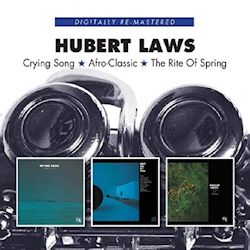La Jean
Love Is Blue/Sing A Rainbow
Crying Song
Listen To The Band
I’ve Gotta Get A Message To You
Feelin? Alright?
Cymbaline
How Long Will It Be?
Let It Be
Fire And Rain
Allegro From Concerto #3 In D
Theme From Love Story
Passacaglia In C Minor
Flute Sonata In F
Pavane
The Rite Of Spring
Syrinx
Brandenburg Concerto #3 (First Movement)
Brandenburg Concerto #3 (Second Movement)
Hubert Laws (flute) with varying personnel
Recorded 1969-71 [71:32 + 30:53]
Hubert Laws occupies rather an ambivalent position in critical estimation. He was very unusual in concentrating on the flute but signing for Creed Taylor
and his band of Memphis Soul specialists should have orientated him squarely in the vanguard of late 1960s Jazz. If the precedent was another elite
flautist, Herbie Mann – who’d already had a hit single for Atlantic – then the decision was sound. But if these three LPs, made between 1969 and 1971,
didn’t seem somewhat incongruous stylistically at the time – and they did, to many people – they certainly do today.
That’s not to denigrate Laws, whose tone is utterly ravishing throughout, but the attempt in the first album, Crying Song, to construct a pop
album with fringe Memphis and Country Soul stylings was never going to satisfy the purists. Others, such as Keith Jarrett and Gary Burton, were naturally
situated along Country Roads and their albums of the late 60s showed strong affinities for the genre within a broader musical context. But Laws’ first
album, despite the presence of stellar sidemen such as Ron Carter, Billy Cobham, and on several tracks George Benson – along with a raft of other superb
players – fails to cohere. Country Soul, the Monkees, mild Psychedelia, the Bee Gees and Lennon/McCartney with sitar impersonations; well, it’s a big ask
for much of this to stand the sterner tests of time.
Afro-Classic
followed in December 1970 and was arranged or adapted by Don Sebesky. Fire and Rain is a long, stand-out track with some deliberate distortion and
plenty of groove but also great lyricism. It shows just how elegant and refined a tonalist Laws was. Elsewhere the intention to fuse classical themes –
Bach and Mozart – with African rhythms strikes one as a bit too much like Loussier (whom I do genuinely admire) for comfort. But there is far more
improvisation on this album which is all to the good, albeit hearing Bach’s Passacaglia in C minor played straight and then funked over 15 minutes is not
necessarily to one’s auditory advantage.
Afro-Classic
played to Laws’ classical strengths. The Rite of Spring clearly did so to an even greater extent. It’s become de rigeur for bands now to explore
the work – the Bad Plus most recently in my experience - but it’s now something of a commonplace. This album occupies the whole of the second CD, and lasts
31 minutes. There’s overdubbing in Debussy’s Syrinx, and the Bach Brandenburg Concerto really does stray into Loussier territory even more than
the Passacaglia; the light dusting of Jazz it receives is none too convincing.
Whatever one feels about all of this, the twofer really does encapsulate a slice of the times. It’s been excellently transferred with extensive and
first-class notes.
Jonathan Woolf
